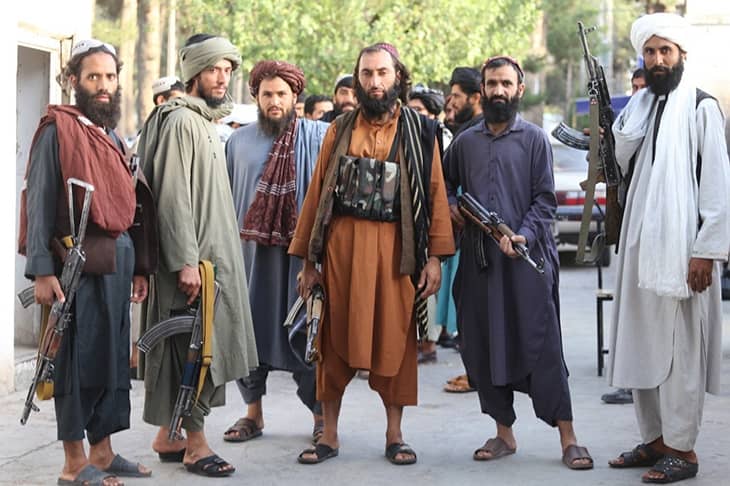The blame game
Sir: Like many who served in Afghanistan, I have watched with growing dismay the recent events unfolding in Kabul (‘Mission unaccomplished’, 21 August). I have also listened with growing frustration to the grand speeches of politicians, pointing fingers while distancing themselves from this tragic debacle.
David Galula, the French military scholar well known for his counter-insurgency thinking, described the role of the military in such operations as providing a secure space for the legitimate government to work safely with the people. He accepted that the military could also be given other suitable and appropriate tasks but was very clear that they must never be in charge. These precepts were at the heart of all our planning and operations. We understood our role and bent body and soul to the task at hand. It seemed to us at the time that few politicians in national capitals and international institutions around the world understood their role or showed the same commitment: none in Kabul did.
No single person, country or organisation is ‘to blame’, and I often reflect on whether I could have tried harder, done more or taken a different approach. The crying shame is that what we are now witnessing was so avoidable.
Maj Gen (retd) Colin Boag
Glasgow
Not so sweet FA
Sir: In his review of Games People Played: a Global History of Sport (Books, 21 August), Simon Kuper repeats the commonly stated view that the FA banned women’s football until 1971. For all their faults, the FA never had the power of the Taliban. As Dr Kevin Moore points out in What You Think about Football Is Wrong, in 1921 the FA suggested affiliated clubs refuse permission for women to play at their grounds, which isn’t quite the same thing (though whether the effect was the same is another matter).
Kevin McGrath
Brighton, East Sussex
Faulty towers?
Sir: Martin Gayford’s piece about building preservation (‘Should it stay or should it go?’, 21 August) raises interesting questions. I think buildings survive for three reasons rather than two — and it goes back to Sir Henry Wotton’s ‘Commoditie, Firmeness and Delighte’: these being the three conditions of ‘well building’. Useful, solid and beautiful, in other words. The Rugeley towers can be said to be solid, as they had to dynamite them, and beautiful, as they exhibited that architectural harmonic device of incorporating a tapering from the ground up, a visual expression of structural stability. As we have decided to abandon coal-fired power stations, the usefulness is clearly in question.
But we need to tick all of Wotton’s three boxes — including usefulness — when we decide whether to preserve old structures. Often it requires only some imagination. Each tower could have accommodated a number of uses including a lot of housing — a central atrium, a green roof garden, photovoltaic cladding, wind turbines on the top, perhaps. I am sure the proposed replacement housing scheme will be lovely — but aren’t problems opportunities?
John Bennett
Southwold, Suffolk
Across the universe
Sir: When I was learning to fly in the mid-1950s, one of the navigational exercises involved finding the way from Wolverhampton to Liverpool. Those of us inspired by the daredevils of the war liked to fly along the railway and read their position from the big letters of the station name-boards. The problem then was finding a very tiny village on a very small-scale aeronautical map, while not forgetting that one was flying an aeroplane at the same time. I soon found that a better trick was to climb up from Wolverhampton in a big spiral, eyeing the northern horizon until I could see the 350-foot cooling tower of Ince B power station silhouetted against the Mersey estuary. All I had to do then was fly towards this huge landmark, and on passing near it, Liverpool airport was magically spread out just ahead. When the cooling tower was destroyed at the end of 1999, I had a little weep.
Michael Spencer
Pittenweem, Fife
Period drama
Sir: ‘Does the vaccine affect periods?’ asks Lara Prendergast (21 August). The answer is most certainly yes and in far greater numbers than the 30,304 UK cases reported online to the MHRA’s Yellow Card scheme. I work as a clinical assessor at various vaccination centres in London and make a point of asking women under the age of 50 whether their menstrual cycle was affected after the first dose. A conservative one in five say their period was either late, or changed. This ranges from being lighter or heavier to, in a few cases, having several bleeds in the month following the vaccine. I write any relevant information in the clinical notes, even though we have not been asked to collect this information. The printed leaflets given to all those having the vaccines does not mention possible changes to the menstrual cycle. One 24-year-old told me that she asked her friends on Instagram whether they had experienced any menstrual changes and her post was instantly blocked.
Name and address supplied
A couple more assumptions
Sir: Charles Moore would not have to travel far from his home to find at least two Anglican churches dedicated to the Assumption of the Virgin (Notes, 21 August): there is Froyle, near Alton, and there is East Wittering — indeed he could buy that one to save it, as its future is with auctioneers.
Neil Fairlamb
All Saints’ Vicarage, Tilford, Surrey
Write to us letters@spectator.co.uk






Comments